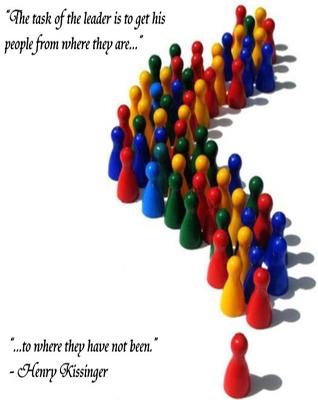Columnists
Where Will Our Leaders Come From?
by I.J.SINGH
The other day I heard a bright young Sikh lawyer wonder aloud where the next generation of Sikh leaders will come from. That brought to mind a pithy little adage that "a people get the leaders they deserve."
We swell with enormous pride when we think of Banda Singh Bahadar, Jassa Singh Ahluwalia, Nawab Kapur Singh, Maharaja Ranjit Singh and Hari Singh Nalwa.
The luster is gone, though not entirely, when we think of Master Tara Singh, Baldev Singh, Gurcharan Singh Tohra, and their contemporaries. And there is barely a glimmer of light if not pitch darkness when we encounter the likes of Giani Zail Singh, Parkash Singh Badal and Navjot Singh Sidhu, et al.
Before readers start to add to the few listed here, let me rush in to admit that the list in every category is deliberately incomplete. There are many, many more that deserve inclusion, but my purpose is not to create a comprehensive listing of all those who have led us - often wisely but sometimes not. I am sure that even in the few that I have listed, opinions will differ.
We live in a different world now. Sikhs are hardly circumscribed to Punjab; they are found all over the globe. All those that I mentioned were or remain Punjab-based. Our realities now are different.
We have been defining our Sikh presence in North America for over a century. But our umbilical cord to Punjab and Punjabi culture remains tight. The past three or four decades were occupied in building Sikh institutions - mostly gurdwaras. So, the leadership of our community - new immigrants - remained tied to the ethos, values and models of Punjab. Now we have a new generation born or largely raised outside Punjab and India.
It is only in the past two decades or so that we seem to be developing a sense of identity and ownership in our new homelands away from Punjab. If the previous generations created institutions to capture the sights, sounds and smells of home, the home in their heads was Punjab.
To a new generation of Sikhs, hoever, the home is here; the sights, sounds and smells are different.
So, how and where are our future leaders going to emerge? Seemingly, not from gurdwaras. Did you ever wonder why?
Look at the larger society and culture around us. America is largely a country of laws. So what kind of people would be drawn to the political institutions here?
Largely lawyers, I would venture. In a country of laws, lawyers have a better understanding of how society functions. Many of the elected representatives, therefore, come from the law. Most of them are reasonably educated; some are truly broadly trained thoughtful minds. Not that all are always wise, tolerant or well-informed. Some even cater to the lowest level of constituency they can find. But most of them can understand the ramifications of the laws they make and interpret every day.
If that is the reality of this country, it follows then that we, too, will change in how we think. Our future Sikh leaders, too, will reflect a mindset that is not tied to Punjab - the land, its culture, style or its politics.
And I think we are well on our way.
Three major organizations, founded by young Sikhs, who are products not of Punjab but of the diaspora, exist at this time: SALDEF (nee SMART), Sikh Coalition and United Sikhs.
They did not take origin in or emerge from our gurdwaras. Yet, they are rooted in the community, and are staffed and led by Sikh lawyers who are products of this society. Their presence speaks to our growing and changing needs in our new homeland.
Of course these organizations or their leaders cannot be divorced from their continuing need to remain connected to Sikhi and reflect Sikh values. Only then will they be able to fulfill their mandate of serving and leading the Sikh community here.
It is almost self-evident but it needs to be said that a vibrant people deserve and need more than excellent lawyers.
So we have spawned the Sikh Research Institute. It has taken the lead to develop tools for the larger educational needs of the community in Sikhi - its history, culture and religion. The Institute is focused on developing the educational process via rigorously developed curricular programs, Web-based symposia and related tools.
Through many other organizations that I leave unnamed, over the years a host of Summer Camps have emerged to introduce both the young and old to the basics of our faith. More books are published in the diaspora for teaching children and adults alike than perhaps in any other country of the world, including India.
Movies are being made to mine our history and to build bridges of understanding with our non-Sikh neighbours. There now exist several Sikh film festivals across North America to highlight our activities in this most challenging and effective media.
I was absolutely amazed to encounter organizations founded by young Sikhs in the diaspora to aid victims of natural disasters like the Tsunami in distant parts of the world, as also those who needed assistance post 9/11 or after Katrina.
Websites galore exist to promote a university without walls for Sikhs worldwide.
In North America, Sikhs have established some academic programs for the study of Sikhs and Sikhism.
Mind you, all these are outside the hallowed halls of gurdwaras of which we have over 200. They, too, continue to serve a purpose but relate only minimally to the world in which we live.
Expansive definitions of our needs and our wants continue to be debated and discussed so that we can find for ourselves an equal place at the table of America and the American Way as Sikhs - and their equivalents across the diaspora.
That is the promise of the multicultural mosaic that we are navigating to define our presence everywhere.
Although Sikhs have been in North America for over a century and that's almost half the historical time-span of the United States, the first step of our march towards equality was won only in 1946 when we earned the right to citizenship. Development of a sense of self and awareness of a place in society takes time and, even more importantly, a critical mass that we did not achieve until the late 1970's after some of the more onerous immigration laws and quotas were rescinded.
A more useful measure of our progress then is the past 40 years or so. Our many activities that I have alluded to as well as our few, hesitant forays into the political process of this society speak well of our direction and progress. Many battles have been won; just as many remain.
Sikhs worldwide have a notable presence in the public space of many nations. In the modern global village in which we live, Sikh presence as technocrats, scientists, entrepreneurs, movers and shakers of the business world, and in academia is beyond question. Outside India, our presence in the national political arena is much better defined in the U.K., Canada, Singapore, Malaysia and East African nations than it is in the United States. In India we appear to be ascendant at this time; in the USA we are still at the beginning of the trek.
Our primary needs are two: First, an equal place at the table as citizens of a multiethnic, multicultural, multi-religious world, including America. Secondly, continuing education in Sikhi so that we remain tethered to the richness of our faith.
While our myriad activities continue to define and explore these; they also serve as the training ground from which the leaders of a new tomorrow will emerge. They will carry the community forward into a new century and beyond.
It would be good to understand that the pursuit of our goals and objectives will require different strategic ends and operative tactics depending on the culture and language in which we live. I hope and pray that semi-autonomous bodies that represent Sikhs in the wider world, including India, will emerge and will learn to work with each other in collaborative and mutual tolerance.
As an infamous commercial of 40 years ago said "You have come a long way baby, but you have a longer way to go."
Expect not painless linear progress without snags. What is assured is the march forward. I have never been more optimistic about our place in the world.
I look to our existing institutions to bring forth the leaders to serve our needs. If our past was glorious and our leaders heroic, those who lead us to a brighter tomorrow will be no less.
Once again then, we will have the leaders we deserve.
 
November 19, 2009
Conversation about this article
1: Michele Gibson (Guelph, Ontario, Canada), November 19, 2009, 9:40 AM.
Fascinating discourse on the topic of leadership, especially the complex intersection of law (politics), culture and religion, for a group of people tethered to their origins at different distances and circumstances. How do you support such a group, at the same time similar and different, united by a single yet adaptable faith without splintering belief? My guess is you keep the language alive! Language, in my understanding, unites these elements and can maintain the foundation and yet provide a platform for adaptation. I look forward to hearing more from you on this, I.J.
2: S.K. (U.S.A.), November 19, 2009, 12:18 PM.
Thank you for your consistently insightful pieces, Dr. I.J. Singh. I'm but a mere soldier in the sea of talented young Sikhs in the U.S.A. Oftentimes I feel frustrated that the entire community (each individual with the potential to give in some way) doesn't support the events/ fundraising activities of the organizations referred to in your piece, and others like them. I'm certainly not one to judge or may very well be in the dark in terms of what people are or are not doing ... but if we don't support our own organizations with our dasvands and our presence, who will? It's through supporting our institutions that they will grow and provide us with the very necessary leadership we need to move swiftly forward.
3: Ravinder Singh Taneja (Westerville, Ohio, U.S.A.), November 19, 2009, 6:59 PM.
It is not uncommon for lawyers to take the lead - witness that freedom movements across the globe (including India) have been led by lawyers. Public leadership involves a sense of service and sacrifice, virtues that are rarely cultivated by Indian parents in their children. Note that most parents push their offspring into professions that offer a safe haven, i.e money, stability, etc. No doubt we are seeing more Sikh kids branch out into the humanities and becoming more visible, but the numbers are minuscule. I suspect that we will see a more active role played by our children - more likely their children. I remain optimistic, though.
4: Harbans Lal (Arlington, Texas, U.S.A.), November 20, 2009, 12:37 PM.
I.J. Singh expressed the sentiments that have been brooding inside many of us for many years. However, not many knew what to do about the vacuum to be felt soon. I continuously observe many who look towards Punjab for an answer until they realize that it was hopeless to look in that direction. I do not mean any disrespect. It is just that our nation is being increasingly internationalized and we are required to produce a different culture of leadership than what may be suitable for Punjab. I recall almost a similar necessity felt by many in the early forties when the All India Sikh Students' Federation was founded in Lahore in 1944. Then, we felt that to fill the vacuum created by the ageing cadre of our leaders of the time, we had to depend on the generation then sitting at the school benches. That doctrine succeeded and it provided leadership in every sphere of our activity, politics, education, religion, science and economics. Dr. Manmohan Singh is one example and I can quote a couple of dozens more. Leadership trained in the "school of federation", as it has come to be known, served the nation for almost half a century until political leadership saw the unique potential and dragged the Sikh Students Federation activists into the petty group politics to serve their selfish and unscrupulous ends. I.J. Singh is sounding the same danger bell as he has recognized that history may repeat itself. We are pleased that among the Sikh students who are now in the colleges and those who are just finishing are some who are being inspired to value their rich heritage and their responsibility toward protecting and promoting their national aspirations. May Guru Gobind Singh inspire these young brave people and guide them in their new ventures.
5: Harvind Kaur (Chicago, Illinois, U.S.A.), November 20, 2009, 3:49 PM.
I am deeply disturbed by a new trend that I am reading among many who are trying to analyze and find a direction for Sikhs in the diaspora. While I do not take issue with the basic questions raised here regarding the need for leadership and from whence it shall come, the subtext concerning the place of Punjab is highly problematic. I speak specifically to: "Our future Sikh leaders, too, will reflect a mindset that is not tied to Punjab - the land, its culture, style or its politics." While there are obvious issues with cultural transmission, to suggest or move towards negating the place of Punjab - the land in particular - is what gives me pause. There can be no future for Sikhs anywhere if we lose touch with the land from which Nanak Sach originated. I do understand the new thought is to move beyond borders; however, we must fully consider the consequence of this new thought on the global political horizon and who benefits from such ideas. Is it in our community's best interest to espouse ideas that move us away from remaining connected to places and history that still live in a place called Punjab? Punjab is already splintered and we must already travel accross borders to realize it as a place. To further suggest that the land is not as relevant seems short sighted as we search for solutions to the myriad of issues our community faces. Our faith is fortunate to be so young so that history lives and breaths in many places accross Punjab. If we lose the connection to that land and those historic cities founded by our Gurus, what do we stand to gain, or more importantly, what do we stand to lose.
6: I.J. Singh (New York, U.S.A.), November 21, 2009, 7:11 AM.
Some intriguing questions have been raised. The nexus of religion, culture and language is complex; these matters are closely, almost inseparably intertwined. Michele Gibson is right and that matters demand a fuller treatment one day soon. I see Harvind Kaurs's concern; in many ways they, too, are fundamentally related to those of Michele. I am not arguing that our concerns, cultural ties, etc., with Punjab be sundered - the land that gave birth to Sikhi, its values and practices. What I mean to suggest are two things: several generations of Sikhs (and many not of Punjabi descent) would mean that their connection to Punjab would automatically undergo a sea change. And secondly, that each settlement of Sikhs - whether in Punjab or out somewhere else in the diaspora would have many local issues in the land where they live - its culture, customs, laws and language, etc. These new realities will impact our thinking and direction. In this mix I would like to see Punjab and Punjabi realities have an important place but not a controlling role. This culturally diverse mix of Sikhs would need to create ways and instruments to collaborate to our mutual benefit. (Keep in mind that in this eclectic mix of Sikhs and Sikhi, there are the fundamentals that unite us.) In this diversity of the Sikh-world, Punjab and Punjabi Sikhs would have a place, but so would Canadian, British or even Sikhs in Timbuktu, if there are any there. But your concerns are valid.
7: Tejwant Singh (Las Vegas, Nevada, U.S.A.), November 21, 2009, 1:51 PM.
We are all witnessing what is happening to Punjab, which is being promoted by the Govt. of Punjab that has made it the highest alcohol consuming state in India. We are also witnessing the politicization of the Akal Takht which has put Prof. Darshan Singh's life in danger. We are also witnessing how Punjabi kids are hooked to drugs and neither the Akal Takhat nor the S.G.P.C. have done anything to curtail this epidemic. The S.G.P.C. was absent during the Tsunamis but the Sikhs in the diaspora came to the help of the victims. So, in a nutshell, we are seeing an absence of leadership based on gurmat ideals in the entire spectrum of Punjabi life. Perhaps, the leaders in the diaspora with their efforts to instill Sikhi/gurmat ideals outside Punjab will produce enough leaders who can go back to Punjab and bring real and much needed change. And/or the so called leaders in Punjab may come to the realization what Sikhi is all about and might start emulating the leaders here and begin to work together for the betterment of humanity sans borders. So, in a nutshell, the future of Punjab and its welfare depends on the present and future Sikh leaders in the diaspora and there is nothing wrong with that because this may be the only way to find the reconnection with the land of five rivers and make it fertile again from all aspects. Thanks, Inder ji, once again for elbowing us so that we could introspect.
8: Ravinder Singh Taneja (Westerville, Ohio, U.S.A.), November 21, 2009, 4:05 PM.
"Young and emphatically orthodox" is how the Globe and Mail reported on the recent Gurdwara elections in Vancouver where a slate of youngsters (in their 20's and 30's) trounced their older counterparts. This bodes well for the Sikh community and is perhaps an indication that second generation and third generation Sikhs are actively taking the lead in the affairs of the community.
9: Jessie Singh Parmar (Lethbridge, Alberta, Canada), November 21, 2009, 7:01 PM.
Very insightful.
10: Suzy Kaur (Oxford, England), November 21, 2009, 8:13 PM.
Sikhs born and raised in Britain, Canada and the U.S.A. have a number of concerns that they wish to address. By and large, they are not concerned with theological debates. By and large, they grow up believing in the rights of the individual over the impositions of the collective. They believe in liberal culture, of live and let live. They want to escape the tyranny of Indian cultural practices such as coercive and forced marriage, racist caste discrimination, cultural and social insularity, and violence rooted in concepts of izzat (including, in extreme cases, honour killings). These are the issues Sikhs born in the diaspora want to free themselves from; any movement or leadership that does not address themselves to these concerns will be a hollow irrelevancy. Sikhs will simply abandon the aspects of the culture that oppresses them, and may increasingly abandon the faith too if the social structure of Sikhism does not make space for them, and the religion and culture cannot adapt to the culture of individual rights and freedoms that diaspora Sikhs have at the core of them.
11: Manpreet Singh (Mumbai, India), November 22, 2009, 8:46 AM.
Dear Doctor Saheb and all others: kindly take a look at www.youngsikhleaders.com. There is a presentation towards the end of the page, kindly see that as well. Having stayed in Singapore for 10 years, I realize what is missing in today's youth from India - we have embarked on this mission. If you think it makes sense, please support us by getting the word around. (We are not looking at any Gurdwara to support us - they can go on putting marble on their edifices and wasting the sangat's money). [EDITOR: A cursory glance over your site shows NO WOMEN! Unless at least 50% of your decision-makers are women, you have got on the wrong bus!]
12: Manpreet Singh (Mumbai, India), November 22, 2009, 9:25 AM.
Dear Veer ji: Thank you for checking out the website. You are right. There are no women in the group that started it. However there are several comments that this is the need of the hour, even from women. Only two of us are married and if we brought in our wives, that too would not be very professional. Just wait a few more days and we would have women on board. One Veer, Param Singh Bhatia ji of U.K. also pointed that out to us ... we started about 2 weeks ago. [EDITOR: It's easier to find women professionals in the Sikh community then men ... but you have to make it a point to complete this FIRST step. Don't drag in your wives, unless one of you stays at home, and your spouse replaces you. We have to stop dragging in our wives as appendages ... they have as much to offer, and sometime more. They should not be an afterthought. This may sound a bit pernickety, but this IS a necessary FIRST STEP to the wonderful project you have embarked on.]






